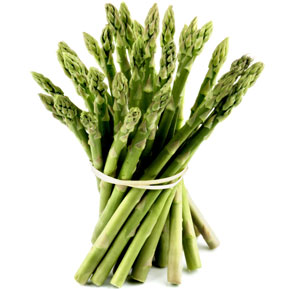





1. Asparagus Facts
2. Types of Asparagus
3. Asparagus Nutritional value
4. Asparagus Health Benefits
Asparagus (Asparagus officinalis) or garden asparagus is a perennial flowering plant species in the genus Asparagus native to Eurasia. Widely cultivated as a vegetable crop, its young shoots are used as a spring vegetable.
Asparagus is an herbaceous, perennial plant growing typically to 100–150 centimetres (3–5 feet) tall, with stout stems with much-branched, feathery foliage. It has been known to grow as long as 3.5 metres (11 ft).
It is usually dioecious, with male and female flowers on separate plants, but sometimes hermaphrodite flowers are found. The fruit is a small red berry 6–10 mm (1⁄4–13⁄32 in) in diameter, which is toxic to humans.
Asparagus grown natively to the western coasts of Europe (from northern Spain to northwest Germany, north Ireland, and Great Britain) are treated as A. officinalis subsp. prostratus (Dumort.) Corb., distinguished by its low-growing, often prostrate stems growing to only 30–70 cm (12–28 in) high, and shorter cladodes 2–18 mm (3⁄32–23⁄32 in) long. Some authors treat it as a distinct species, A. prostratus Dumort.
History and Origin
The name asaparagus is from the Greek word meaning "shoot" or "sprout". It is believed to have originated from the eastern Mediterranean region 2000 years ago. Here it was valued for it's unique texture, medicinal and aphrodisiac qualities.
The ancient Greeks loved wild asparagus but it was the Romans who first cultivated it. Emperor Augustus coined a phrase meaning "to do something faster than you can cook asparagus". Asparagus growing beds in Northern Italy were famous during the Renaissance period. This plant was a sign of elegance and deemed a delicacy only affordable by the wealthy.
- • Green Asparagus
- • White asparagus
- • Purple asparagus
The main types of asparagus are green, purple, and white, distinguished by their colour and flavour. Green is the most common, while purple asparagus is sweeter and more tender. White asparagus is grown without sunlight, resulting in a milder flavour and is popular in Europe.
Green asparagus
Appearance: The most common type, with green stalks that can range from pencil-thin to very thick.
Flavour: A classic, full-bodied asparagus flavour.
Cultivars: Popular varieties include 'Jersey Giant', 'Apollo', and 'Mary Washington'.
Purple asparagus
Appearance: Vibrant purple spears that contain high levels of anthocyanins.
Flavour: Sweeter and nuttier than green asparagus, though it loses its colour and turns green when cooked.
Cultivars: Popular varieties include 'Purple Passion' and 'Pacific Purple'.
White asparagus
Appearance: Grown underground to block sunlight, which prevents chlorophyll production.
Flavour: Milder and more delicate than green asparagus, with a less bitter taste. It is also often thicker and may need to be peeled.
Cultivars: Popular in Europe, where it is sometimes referred to as "white gold".
Other types
Wild asparagus: This is not a specific variety but refers to asparagus that grows naturally in some areas, often being more tender and sweet.
Vegetables " Asparagus " ( Nutritional value )
Nutritional value per 100 g
Asparagus, cooked, boiled, drained, with salt
| Nutrient (Proximity) |
Unit
|
Value
|
Daily Value %
|
|
Energy
|
kcal
|
22
|
1.1%
|
|
Protein
|
g
|
2.40
|
4.8%
|
|
Total lipid (fat)
|
g
|
0.22
|
0.2%
|
|
Carbohydrate, by difference
|
g
|
4.11
|
1.4%
|
|
Fiber, total dietary
|
g
|
2.0
|
7.1%
|
|
Sugars, total
|
g
|
1.30
|
|
|
Minerals
|
|||
|
Calcium, Ca
|
mg
|
23
|
1.7%
|
|
Iron, Fe
|
mg
|
0.91
|
5%
|
|
Magnesium, Mg
|
mg
|
14
|
3.3%
|
|
Phosphorus, P
|
mg
|
54
|
4.3%
|
|
Potassium, K
|
mg
|
224
|
4.7%
|
|
Sodium, Na
|
mg
|
240
|
10.4%
|
|
Zinc, Zn
|
mg
|
0.60
|
5.4%
|
|
Copper, Cu
|
mg
|
0.165
|
18.3%
|
|
Manganese, Mn
|
mg
|
0.154
|
6.6%
|
|
Selenium, Se
|
mcg
|
6.1
|
11%
|
|
Fluoride, F
|
mcg
|
21.9
|
|
|
Vitamins
|
|||
|
Vitamin C, total ascorbic acid
|
mg
|
7.7
|
8.5%
|
|
Thiamin (B-1)
|
mg
|
0.162
|
13.5%
|
|
Riboflavin (B-2)
|
mg
|
0.139
|
10.6%
|
|
Niacin NE (niacin) (B-3)
|
mg
|
1.08
|
6.7%
|
|
Pantothenic acid (B-5)
|
mg
|
0.225
|
4.5%
|
|
Pyridoxine (vitamin B6)
|
mg
|
0.079
|
4.6%
|
|
Folate DFE (dietary folate) (B-9)
|
mcg
|
149
|
37.2%
|
|
Choline
|
mg
|
26.1
|
4.7% |
|
Cobalamine (vitamin B12)
|
mcg
|
0.00
|
|
|
Vitamin A, RAE (retinol)
|
mcg
|
50
|
5.5%
|
|
Vitamin E (alpha-tocopherol)
|
mg
|
1.50
|
10%
|
| Vitamin D (D2 + D3) |
mcg
|
0
|
|
|
Vitamin K (phylloquinone)
|
mcg
|
50.6
|
42.1%
|
|
Lipids
|
|||
|
Saturated Fatty Acids
|
g
|
0.048
|
0.2%
|
|
Monounsaturated Fatty Acids
|
g
|
0.000
|
|
|
Polyunsaturated Fatty Acids
|
g
|
0.105
|
|
|
Trans Fatty Acids
|
g
|
0.000
|
|
|
Cholesterol
|
mg
|
0
|
|
|
Carotenoids
|
|||
|
Beta-Carotene
|
mcg
|
604
|
|
|
Lutein + zeaxanthin
|
mcg
|
771
|
|
|
Lycopene
|
mcg
|
30
|
|

Reference Values are based on a 2,000 Calorie Intake, for Adults and Children 4 or More Years of Age. Your daily values may be higher or lower depending on your calorie needs.
Percentages are roughly approximated using (RDA) Recommended Dietary Allowances for adults.
Source: USDA (United States Department of Agriculture)
Reference Values for Nutrition – FDA (U.S. Food and Drug Administration)
Asparagus Nutritional Value
Asparagus offers numerous health benefits due to its rich content of vitamins, minerals, fiber, and antioxidants. It is known to support heart health by helping to lower blood pressure and cholesterol, aid in digestion, boost the immune system, and may help with weight management. It is also an excellent source of folate, important for cell growth and a healthy pregnancy.
- HAS STRONG ANTIOXIDANT PROPERTIES
Asparagus has strong antioxidant properties due to its rich content of compounds like glutathione, rutin, saponins, and vitamins. These antioxidants help protect the body from damage caused by free radicals, which may reduce the risk of various diseases. - ASPARAGUS HAVE ANTICANCER EFFECTS
Asparagus, a widely consumed savoury vegetable, is a rich source of antioxidants, saponins, vitamins, and minerals. In recent years, it has been shown that components of asparagus have anticancer effects on endometrial adenocarcinoma, and in prostate, breast, and colon cancer. In pancreatic cancer, it has been shown to have an anticancer effect on the KLM1-R cell line. - HEART HEALTH
Asparagus benefits heart health by helping to lower blood pressure and cholesterol, regulating homocysteine levels, and providing antioxidant and anti-inflammatory effects. It contains potassium, which helps manage blood pressure, and fiber, which binds to and removes excess cholesterol. The B vitamin folate helps prevent the buildup of homocysteine, a substance linked to heart disease - WEIGHT MANAGEMENT
Asparagus aids weight management because it is low in calories and fat, high in fiber, and a natural diuretic. The fiber helps you feel full and slows digestion, which can reduce overall calorie intake, while its diuretic properties help flush out excess fluid and waste. It is a nutrient-dense food that can be a satisfying addition to a weight loss diet when prepared healthily, like roasting or grilling.

- NUTRIENT-RICH
Asparagus has strong antioxidant properties due to its content of vitamins C and E, glutathione, flavonoids, and polyphenols. These compounds help neutralize free radicals, protecting cells from damage and potentially lowering the risk of chronic diseases. This antioxidant action can also contribute to slowing the aging process, supporting immune function, and promoting skin health. - PREGNANCY SUPPORT
Asparagus supports pregnancy because it is a rich source of folate, which is crucial for the development of the baby's brain and spine and helps prevent neural tube defects. It also provides other beneficial nutrients like Vitamin K, fiber, and antioxidants. While eating asparagus is safe during pregnancy, it is recommended to focus on whole food sources and always take a folic acid supplement as advised by a healthcare provider, especially in the first trimester. - MAY HELP WITH UTIS
Asparagus contains high levels of asparagine, an amino acid, which makes asparagus a natural diuretic. In other words, eating a lot of asparagus can help excrete excess fluid and salt from the body, helping to prevent urinary tract infections. - EYE HEALTH
Asparagus supports eye health primarily due to its content of antioxidants like lutein and zeaxanthin, which protect the macula, the part of the retina responsible for sharp, detailed vision. It also provides Vitamin A, which is crucial for the proper functioning and lubrication of the eyes, and Vitamin C and E, which are also antioxidants that help protect eye cells. These nutrients can help prevent eye conditions like age-related macular degeneration and cataracts.
References
Nutrient Database - USDA (United States Department of Agriculture)
Reference Values for Nutrition - FDA (U.S. Food and Drug Administration)
Nutrient-rich - Asparagus has strong antioxidant properties due to its content of vitamins C and E, glutathione, flavonoids, and polyphenols. These compounds help neutralize free radicals, protecting cells from damage and potentially lowering the risk of chronic diseases. This antioxidant action can also contribute to slowing the aging process, supporting immune function, and promoting skin health.
Has strong antioxidant properties - Asparagus has strong antioxidant properties due to its rich content of compounds like glutathione, rutin, saponins, and vitamins. These antioxidants help protect the body from damage caused by free radicals, which may reduce the risk of various diseases.
Heart health - Asparagus benefits heart health by helping to lower blood pressure and cholesterol, regulating homocysteine levels, and providing antioxidant and anti-inflammatory effects. It contains potassium, which helps manage blood pressure, and fiber, which binds to and removes excess cholesterol. The B vitamin folate helps prevent the buildup of homocysteine, a substance linked to heart disease.
Weight management - Asparagus aids weight management because it is low in calories and fat, high in fiber, and a natural diuretic. The fiber helps you feel full and slows digestion, which can reduce overall calorie intake, while its diuretic properties help flush out excess fluid and waste. It is a nutrient-dense food that can be a satisfying addition to a weight loss diet when prepared healthily, like roasting or grilling.
Asparagus have anticancer effects - Asparagus, a widely consumed savory vegetable, is a rich source of antioxidants, saponins, vitamins, and minerals. In recent years, it has been shown that components of asparagus have anticancer effects on endometrial adenocarcinoma, and in prostate, breast, and colon cancer. In pancreatic cancer, it has been shown to have an anticancer effect on the KLM1-R cell line.
Pregnancy support - Asparagus supports pregnancy because it is a rich source of folate, which is crucial for the development of the baby's brain and spine and helps prevent neural tube defects. It also provides other beneficial nutrients like Vitamin K, fiber, and antioxidants. While eating asparagus is safe during pregnancy, it is recommended to focus on whole food sources and always take a folic acid supplement as advised by a healthcare provider, especially in the first trimester.
May help with UTIs - Asparagus contains high levels of asparagine, an amino acid, which makes asparagus a natural diuretic. In other words, eating a lot of asparagus can help excrete excess fluid and salt from the body, helping to prevent urinary tract infections.
Eye health - Asparagus supports eye health primarily due to its content of antioxidants like lutein and zeaxanthin, which protect the macula, the part of the retina responsible for sharp, detailed vision. It also provides Vitamin A, which is crucial for the proper functioning and lubrication of the eyes, and Vitamin C and E, which are also antioxidants that help protect eye cells. These nutrients can help prevent eye conditions like age-related macular degeneration and cataracts.
Asparagus supports digestive health (due to its high fiber and inulin content, acting as a prebiotic that feeds beneficial gut bacteria, promotes regularity, and helps prevent constipation). The inulin passes undigested to the large intestine, where it nourishes healthy gut bacteria, which in turn helps maintain a balanced microbiome, reduces inflammation, and improves digestion.
Asparagus is beneficial during pregnancy (because it is a rich source of folate, a B vitamin vital for the baby's brain and spinal cord development and for reducing the risk of neural tube defects like spina bifida).
Asparagus helps regulate blood sugar (due to its fiber content, which slows digestion and glucose absorption, and also contains antioxidants that may reduce inflammation and oxidative stress linked to diabetes). It is an excellent source of folate (folic acid), which is essential for producing red blood cells, cell division, and foetal development.
Asparagus may reduce the risk of certain cancers (due to its rich content of anti-inflammatory and antioxidant nutrients, including flavonoids, folate, and saponins). These compounds, found in asparagus, help fight free radicals and oxidative stress, can activate cell self-destruction of abnormal cells, and influence gene expression to combat cancer development. Including asparagus as part of a varied diet rich in vegetables can contribute to overall health and potentially lower cancer risk.
Asparagus supports heart health (by contributing soluble fiber, which helps lower "bad" LDL cholesterol and can improve blood sugar control, reducing the overall risk of heart disease). The vegetable also contains antioxidants and potassium, which support cardiovascular health by reducing inflammation and blood pressure, respectively.
Asparagus is beneficial for type 2 diabetes (due to its high content of anti-inflammatory and antioxidant nutrients, including vitamins C and E, glutathione, and flavonoids like quercetin). It also contains saponins, inulin (a prebiotic fiber), and B vitamins, which support insulin sensitivity, gut health, and blood sugar regulation. Its low glycemic index further aids in blood sugar management.
Blood clotting and bone health (Asparagus is an excellent source of Vitamin K, a fat-soluble vitamin crucial for blood clotting and bone health). A single cup of raw asparagus contains about 56 micrograms of Vitamin K, contributing significantly to the daily recommended intake for adults. Because Vitamin K can affect blood-thinning medications, individuals taking them, such as warfarin (Coumadin), should consult their doctor before significantly increasing their asparagus consumption.
Asparagus can help combat fatigue (because it is rich in B vitamins (folate, niacin, riboflavin, and pantothenic acid) that are essential for energy production, and it also contains iron, which is vital for preventing fatigue caused by anaemia). Additionally, a specific extract, Enzyme-Treated Asparagus Extract, has been shown in studies to reduce feelings of tiredness and improve sleep quality, making it a useful food for improving energy levels.
Asparagus can help with urinary tract infections and increase urine output because it acts as a natural diuretic (which means it promotes the removal of excess fluid and salt from the body). By increasing urination, asparagus helps flush bacteria out of the urinary tract, which can aid in preventing Infections. It is also a good source of fiber, vitamins, and minerals that support overall bladder and kidney health.
Asparagus may help prevent kidney stones (because of its high-water content, natural diuretic properties, and potassium, which helps to counteract sodium's effect on stone formation).
Asparagus spears are commonly consumed as a food, but asparagus extracts are possibly unsafe to use when pregnant. Asparagus extracts have been used for birth control, so they might harm hormone balances during pregnancy.
